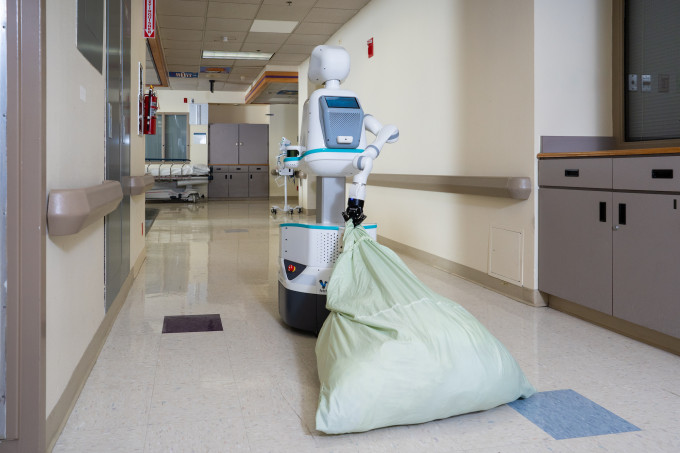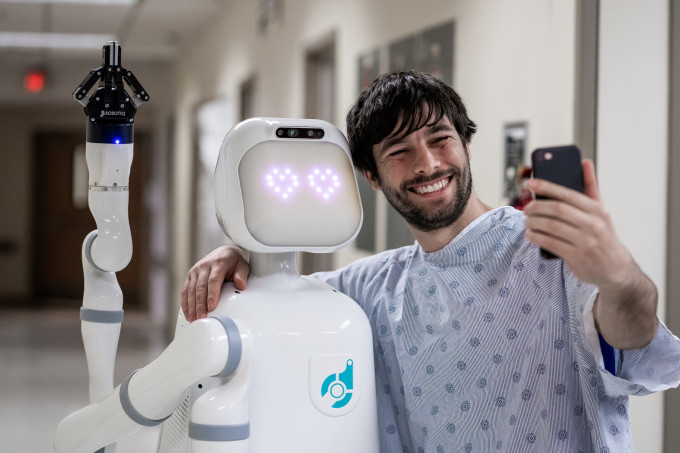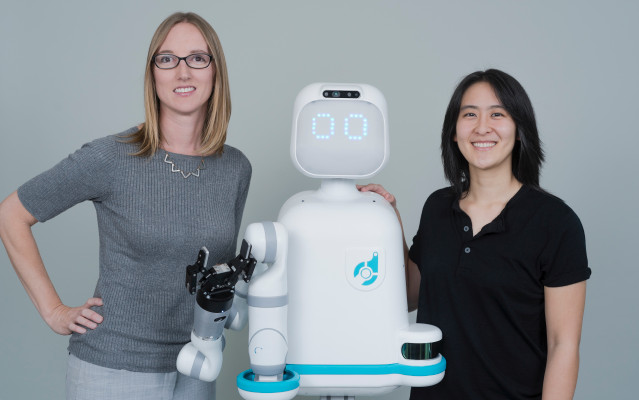28% of a nurse’s time is wasted on low-skilled tasks, such as searching for medical tools. We need you focused on the complex and compassionate work of treating patients, especially in the midst of the coronavirus outbreak. Diligent robotics He wants to give them an auxiliary droid who can run errands for the hospital. The startup’s Moxi bot is equipped with a flexible arm, a grabbing hand, and full mobility so you can search for light medical resources, navigate the hallways of a clinic, and leave them for the nurse.
With the world facing a critical shortage of healthcare professionals, Moxi could help healthcare centers use their staff as efficiently as possible. And because robots cannot be infected by COVID-19, they are one less potential carrier that interacts with vulnerable populations.
Today, Diligent Robotics announces its $ 10 million Series A that will help it scale to deliver “more robots to more hospitals,” CEO Andrea Thomaz tells me. “We have been designing our product, Moxi, together with the hospital clients because we don’t just want to give them an automation solution for their material management problems. We want to give them a robot that the frontline staff is happy to work with and feels like part of the team. “
 The round, led by DNX Ventures, brings Diligent Robotics to $ 15.75 million in total funds that propelled him to the fifth generation of his Moxi robot. He currently has two deployed in Dallas, Texas, but is already working with two of the top three hospital networks in the United States. “As the current pandemic and circumstances have shown, the real heroes are our healthcare providers, ”says Q Motiwala, partner at DNX Ventures. The new cash from DNX, True Ventures, Ubiquity Ventures, Next Coast Ventures, Grit Ventures, E14 Fund and Promus Ventures will help Diligent Robotics expand Moxi use cases and perfectly complement nurses workflows to help alleviate the talent crisis.
The round, led by DNX Ventures, brings Diligent Robotics to $ 15.75 million in total funds that propelled him to the fifth generation of his Moxi robot. He currently has two deployed in Dallas, Texas, but is already working with two of the top three hospital networks in the United States. “As the current pandemic and circumstances have shown, the real heroes are our healthcare providers, ”says Q Motiwala, partner at DNX Ventures. The new cash from DNX, True Ventures, Ubiquity Ventures, Next Coast Ventures, Grit Ventures, E14 Fund and Promus Ventures will help Diligent Robotics expand Moxi use cases and perfectly complement nurses workflows to help alleviate the talent crisis.
Thomaz came up with the idea of a hospital droid after completing his doctorate in social robotics at the MIT Media lab. Its co-founder and CTO Vivian Chu had completed a master’s degree at UPenn on how to give robots a sense of touch, and then came to work with Thomaz at Georgia Tech. They were inspired by a study that revealed how nurses spent so much time acting like waffles. So in 2016 they applied for and won a $ 750,000 grant from the National Science Foundation that funded a six-month sprint to build a Moxi prototype.
Since then, 18-person Diligent Robotics has worked with hundreds of nurses to learn exactly what they need from a freelance assistant. “Today You will go on with your day, and you probably won’t interact with any robots … we want to change that, “Thomaz tells me.” The only way you can really get robots out of warehouses, off the factory floors, is to build a robot that can function in our messy and dynamic human environments. ” The startup’s intention is not to completely replace humans, which it doesn’t think is possible, but to let them focus on the more human elements of their jobs.
Moxi is human-sized, but is designed to look like a movie robot from the ’80s so as not to spawn a strange cyborg rarity in the valley. His head and eyes can move to indicate intention, such as which direction he is about to move, while sounds allow him to communicate with nurses and recognize their orders. A movable abutment allows you to adjust its height, while the clamp’s hand and arm can pick up and drop smaller pieces of hospital equipment. Its round shape and polite navigation ensure you can politely share crowded hallways and travel by elevator.

Diligent Robotics solution engineers work with hospitals to teach Moxi how to get around and what they need. The company hopes to eventually develop the ability to learn and adapt directly to the bot so that nurses can teach it new tasks on the go. “The team continues to demonstrate unrivaled robotics-specific innovation by combining social intelligence and human-guided learning capabilities,” says Rohit Sharma, a partner at True Ventures and a board member at Diligent.
Hospitals pay an upfront fee to buy Moxi robots, and then there is a monthly fee for software, services, and maintenance. Thomaz admits that “Hospitals are naturally risk-averse and can be cautious about embracing new technologies, ”so the startup is taking a slow and steady deployment approach so that it can convince buyers that Moxi is worth the learning curve.
Diligent Robotics will compete with companies like Aethon’s TUG bot to pull laundry and pharmacy carts. Other players in the hospital tech space include Xenex’s machine that disinfects rooms with light and surgical bots like those by Auris and Intuitive Surgical by Johnson & Johnson.

Diligent Robotics hopes to differentiate itself by building social intelligence at Moxi so that it feels more like an intern than a device. “Time and time again, we hear from our hospital partners that Moxi not only returns time to her days, but also makes them smile, ”says Thomaz. The company wants to develop Moxi for other boring, dirty, or dangerous service jobs.
Finally, Diligent Robotics hopes to bring Moxi into people’s homes.. “WWhile we don’t see robots replacing company and human connection, we do dream of a time when robots can make nursing homes more nice to make up for the often staggering number of caregivers per bed ratio (as bad as 30: 1), “concludes Thomaz. That way, Moxi could”help people age with dignity and maintain their independence as long as possible. “



